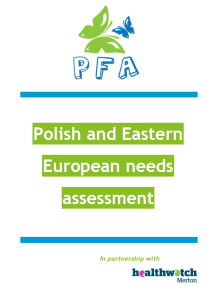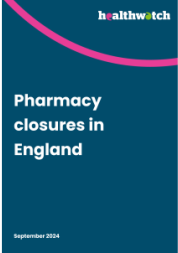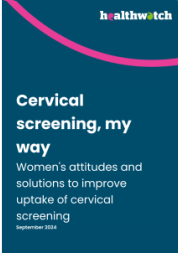Polish and Eastern European needs assessment

Our assessment highlights critical areas requiring attention: a significant lack of health awareness, with many unaware of how lifestyle factors impact their well-being, pervasive vaccine hesitancy, and widespread confusion about navigating the healthcare system. Addressing these issues through culturally appropriate information and targeted initiatives is essential. By promoting accurate, accessible health information and fostering a stronger connection between this community and the NHS, we can enhance their engagement, improve preventative care practices, and ultimately support better health outcomes for Eastern Europeans in Merton.
Recommendations:
Sustainable Community Engagement with the NHS:
Implementation of long-term engagement strategies that focus on two-way dialogues, encouraging community members to proactively engage with healthcare services are essential. This would require working with local organisations whom already have established trust within the Polish/EE communities to utilise their existing links to the community to support the NHS to build trust and rapport locally by meeting communities where they are, both physically and culturally; For example, organising workshops, community drives and community medical camps which are based in places of existing community engagement. The NHS long term plan mentions a budget of 4.5 billion pounds to be set aside for community care (NHS long term plan, 2019). Utilisation of these funds for the events listed above can help build trust between the NHS and the EE community while also reducing unnecessary hospital spells as another outcome.
Designing Targeted Interventions:
The focus for targeted interventions should lay, in the communities, these need to be developed to address the specific health inequalities faced by Eastern European communities. The interventions should be culturally tailored and involve collaboration between local organisations already working with Polish/EE communities and healthcare providers to ensure services are well informed and to assure cultural competence. Examples of such interventions include organising events, meetings, workshops, and focus groups that bring together professionals and community members. These community-based activities will help bridge the understanding of the NHS and other healthcare concerns among the Eastern European population and will help in facilitating their integration into the healthcare system.
Research conducted by the University of Southampton (Gafari, 2023) as part of a nationwide consortium in the UK highlighted those strategies like meeting in the community, co-production of interventions and utilising community partners have been effective in overcoming distrust and disengagement. Underscoring the practicality and effectiveness of recommendations 1,2 in their potential for successful implementation with the Eastern European community.
Culturally Sensitive Health Care Promotion:
To enhance community understanding and involvement, it is essential to develop and implement culturally sensitive health promotion materials and campaigns that resonate with the Eastern European population. This can be promoted through already existing networks that engage with the community. By actively involving community members in the creation and dissemination of these materials, a stronger trusted relationship can be built and ensures that health promotion efforts are both effective and well-received.
Training and Capacity Building within Existing Community Organisations Already Supporting Polish/Eastern Europeans:
A key aspect of improving healthcare access for Eastern European communities is equipping the community organisations that engage with this population with the necessary skills and knowledge. Training should focus on relevant issues addressing health disparities specific to this demographic. This can be achieved by offering workshops and skill-building sessions for both healthcare professionals and community family support work. Additionally, providing ongoing training materials and capacity-building support to community organisations will strengthen their ability to serve as effective mediators between the healthcare system and the community.
Implementation of Interventions and Evaluation:
Once the tailored interventions and programs are developed, they should be launched in a phased approach to ensure smooth implementation and gradual building of trust and engagement. Continuous monitoring and evaluation of these programs is essential to make real-time adjustments based on community feedback and observed outcomes. This process will help refine the interventions and maximise their impact on the Polish and Eastern European population.
Advocacy for Policy Change:
There needs to be change in policy addressing the invisibility of the EE community in the CORE20PLUS5 analysis. Currently they are underrepresented or misclassified as ‘white’/‘white other’. The Polish Family Association by participating in Optum Evaluation and Monitoring exercise (funded by the ICB) found that there are fundamental issues with demographic representation and data monitoring. For example, when new preventative services are designed for disadvantaged communities, they do not target Polish and Eastern European communities, as they are not correctly represented in CORE20PLUS5 analysis. It is necessary that within wider policy a separate characteristic is created for the Eastern European community, this does not have to go into specifics but there needs to be a separate Eastern European characteristic that differentiates from White Other. This would allow them to be heard rather than being classed inappropriately and being culturally invisible to the system.

